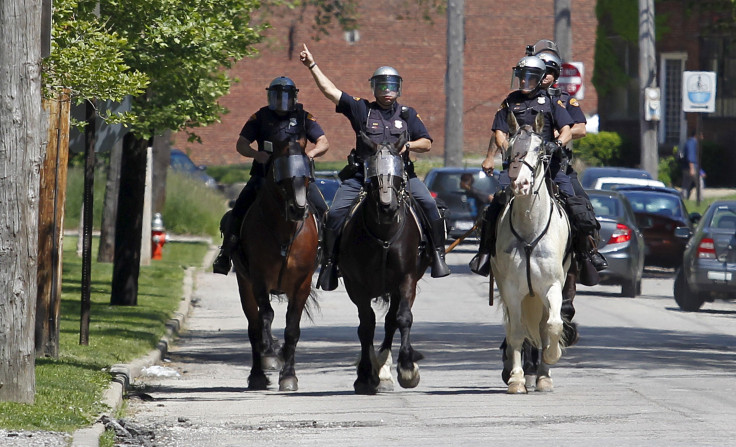Cleveland Police Agree To Strict New Regulations, Oversight In Settlement With Justice Department

The Cleveland Police Department agreed Tuesday to adhere to new regulations on how and when officers can use force as well as strict oversight by police supervisors, the New York Times reported. The deal is part of the Ohio city's settlement with the U.S. Department of Justice over what federal officials deemed a “pattern or practice” of unnecessary force and unconstitutional tactics.
The new rules as outlined in the agreement prohibit pistol whipping, firing warning shots and using force as punishment for talking back or running away. The settlement also requires the police department to document every incident where an officer so much as unholsters a gun. An independent monitor will also track the department's progress, the Times reported.
"A fundamental goal of the revised use of force policy will be to account for, review, and investigate every reportable use of force," the agreement said.
Mayor Jackson is speaking now. Calls this "a new day of policing for the City of Cleveland." @wkyc pic.twitter.com/ROQqkxHemN
— Andrew Horansky (@WKYCAndrewH) May 26, 2015The settlement was announced three days after a judge acquitted Cleveland Police Officer Michael Brelo of manslaughter in the fatal shooting of two unarmed people in a car in 2012. The Justice Department, led by then-Attorney General Eric Holder, launched an investigation into the Cleveland force months after the shooting and issued its report in December.
The damning report accused the Cleveland Police Department of illegally using deadly force against citizens, including incidents where officers shot at residents, sprayed them with chemicals and hit them in the head. Mayor Frank Jackson agreed to new equipment and training for the police following the report's release.
“Supervisors throughout the chain of command endorse questionable and sometimes unlawful conduct by officers,” Vanita Gupta, the Justice Department’s top civil rights prosecutor, said in the report. “Officers are not provided with adequate training, policy guidance and supervision to do their jobs safely and effectively.”
The deal reached Tuesday has allowed the city of Cleveland to avoid the expense and bad publicity of going to court. It's the first settlement made under the new attorney general, Loretta Lynch, who took office last month. It's also the latest investigation by the Obama administration into local police tactics.
Cleveland -- along with Baltimore, New York City and Ferguson, Missouri -- has become a hot spot for the growing national debate over policing and race. Protesters marched through the Ohio city on Saturday, after a judge declared Brelo not guilty of manslaughter for the 2012 shooting. Brelo, who is white, mistook the sound of the car backfiring for gunshots and fired 15 shots into the vehicle. The two occupants, Timothy Russel and Malissa Williams, who were both black, died from gunshot wounds.
The Justice Department has opened more than 20 investigations of police departments across the country in the past five years, the Washington Post reported. A number of young, unarmed black citizens have died from apparent incidents of deadly police force.
Federal prosecutors have not yet decided whether to bring charges against Cleveland police officers in the death of 12-year-old Tamir Rice, who in November was shot by police while playing with a toy gun in a park. The case of Tanisha Anderson, 37, who died after she was restrained by police in a prone position on the pavement, is also still pending, the New York Times reported.
© Copyright IBTimes 2024. All rights reserved.











